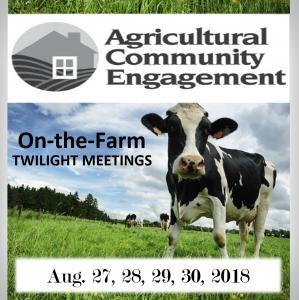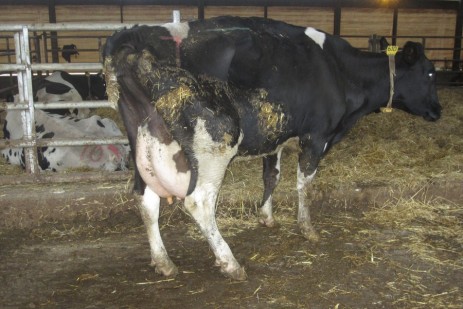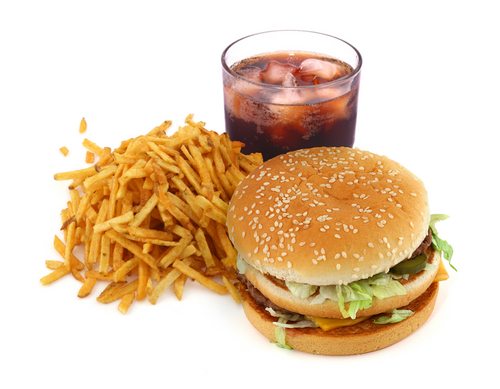|
Brought to you by Dairy's Professional Development Organization®
|
|
Opportunities to learn...

LOOKING TO BETTER CONNECT WITH FARMERS? Agricultural Professional Partnerships® (APPs) is an on-farm professional-development experience created for professionals with a limited background in dairy farming. This 3-day program will be held on three separate dairy farms in the Madison, Wis. area July 24-26. Attend to learn about animal care practices, environmental stewardship techniques, employee management, the economics of production agriculture and more. Attendees will be equipped to better serve their dairy-producer customers. For more information and to register, click here or call 800-947-7379.
FARM TOURS AND ICE CREAM WILL BRING ELECTED OFFICIALS TO DAIRY FARMS with educators, community members and dairy producers. The Agricultural Community Engagement® (ACE) On-the-Farm Twilight meetings will be held in August. Wisconsin Counties Association, Wisconsin Towns Association and PDPW are bringing these meetings to the dairy and non-dairy sectors to provide an open forum for discussion about key issues facing rural communities and agriculture. Meetings begin with a one-hour tour of the host dairy farm from 6:00 to 7:00 p.m., followed by ice cream, discussion and a question-and-answer session. Make plans to attend one of the following events:

- Mon., Aug. 27: Kellercrest Holsteins, 1141 County Highway JG South, Mt. Horeb, WI 53572
- Tue., Aug. 28: Miltrim Farms, 1715 W Townline Rd., Athens, WI 54411
- Wed., Aug. 29: Brey's Cycle Farm LLC, 2139 County Road O, Sturgeon Bay, WI 54235
- Thu., Aug. 30: Double S Dairy, N3447 Marshview Rd., Markesan, WI 53946
These are FREE community events, for additional information, click
here
, call 800-947-7379 or email mail@pdpw.org.

ARE YOU REPORTING AND TRACKING CREDITS WITH DAIRY ADVANCE®?
This award-winning continuing-education tracker - powered by PDPW - is free for dairy producers and continues to grow in the number of accredited education providers and subscribers, with 28 states currently represented. The online tool enables farmers and their team members to easily track their CE credits and progress toward their professional-development goals.
"Consumers' expectations of farmers and farming are changing, and it's affecting the entire food chain. It's never been more important for dairy farmers to be proactive and prepared to demonstrate our dedication to continuous improvement," said Mitch Breunig of Mystic Valley Dairy in Sauk City, Wis. "Dairy AdvanCE makes that easy."
Dairy AdvanCE allows users to access its features directly from their mobile device or desktop computer at any time. Get more details at DairyAdvanCE.org and start finding, tracking and reporting your Continuing Education (CEs) units today.
To track or report your CEs - or for more details
click here
.
|
For your dairy...

SHORTER PARTICLE SIZE OF STRAW IMPACTED MILK PRODUCTION
in early-lactation dairy cows, according to research in the Journal of Dairy Science. The goal of the study was to determine the effect of reducing particle size of wheat straw in a total mixed ration on cow behavior, health and production in early lactation. The study included 41 Holstein cows for 28 days after calving. Of these, 21 cows received TMR with 9% wheat straw (dry matter basis) chopped using a 2.54-cm screen. The remaining 20 cows received the same TMR with wheat straw chopped using a 5.08-cm screen (long; n = 20). Cows on the short-straw treatment tended to produce over 165 pounds more milk cumulatively during the first 28 days, suggesting that cows selected against physically effective fiber in TMR with longer straw particle size, which may have contributed to greater fluctuations in rumination time, reticulorumen pH, dry matter intake, and milk production in early lactation.
Click
here
to read more.
 UNDERSTANDING HOW A COW'S GENETICS INFLUENCE MICROBIAL POPULATIONS inside her stomach and the impact they have on digestion and feed utilization was the focus of an international research study. Researchers fed cows diets high in grain and sugar in an attempt to induce acidosis, then studied rumen samples. The small study suggested markers exist for susceptibility to ruminal acidosis and warrant a larger study. Read Frontiers in Genetics journal article here. UNDERSTANDING HOW A COW'S GENETICS INFLUENCE MICROBIAL POPULATIONS inside her stomach and the impact they have on digestion and feed utilization was the focus of an international research study. Researchers fed cows diets high in grain and sugar in an attempt to induce acidosis, then studied rumen samples. The small study suggested markers exist for susceptibility to ruminal acidosis and warrant a larger study. Read Frontiers in Genetics journal article here.
 IDENTIFYING PROBLEMATIC ENVIRONMENTAL AND ANIMAL FACTORS can help dairy producers prevent common causes of the costly and painful condition. Poor hygiene, walking surfaces with poor traction and pressure on the sole from excessive weight-bearing or rough walking surfaces are environmental factors that influence lameness. Rumen acidosis, weakening of the suspensory mechanism in the foot, severe disease and incorrect levels of trace minerals are animal factors that contribute to lameness. In addition, the condition of the claw capsule contributes greatly to animal hoof health, as does a cow's hoof-interdigital space and the bulbs of heels. These characteristics should be monitored and abnormalities tracked. Read more here. IDENTIFYING PROBLEMATIC ENVIRONMENTAL AND ANIMAL FACTORS can help dairy producers prevent common causes of the costly and painful condition. Poor hygiene, walking surfaces with poor traction and pressure on the sole from excessive weight-bearing or rough walking surfaces are environmental factors that influence lameness. Rumen acidosis, weakening of the suspensory mechanism in the foot, severe disease and incorrect levels of trace minerals are animal factors that contribute to lameness. In addition, the condition of the claw capsule contributes greatly to animal hoof health, as does a cow's hoof-interdigital space and the bulbs of heels. These characteristics should be monitored and abnormalities tracked. Read more here.
|

LABELING CAN REDUCE CONSUMER FEARS
of GMO food, according to research following Vermont's law requiring labels on food containing genetically modified ingredients. The law was in effect from July 1 through July 27, 2016. A study of more than 7,800 respondents found that opposition to genetically engineered foods fell by 19% in the state after implementation of mandatory labels. This was the first study to look at the real-world impact of labeling on consumer opinion. Read more in this article.
 CALORIE-COUNT POSTINGS IMPACT MILLENNIAL FOOD CHOICES the most at restaurants, according to a recent survey. Labeling regulations from the Food and Drug Administration went into effect earlier this year requiring restaurants to display calorie counts on menus. Overall, 60% of respondents said that calorie counts would slightly or heavily influence their decisions. Males between the age of 18 and 24 reported the highest percentage of influence, at 70%. The survey also found that foods with high calorie counts can have a lasting impression, with 27% of respondents saying they remember never ordering a food item again after finding out the calorie count. See full results here. CALORIE-COUNT POSTINGS IMPACT MILLENNIAL FOOD CHOICES the most at restaurants, according to a recent survey. Labeling regulations from the Food and Drug Administration went into effect earlier this year requiring restaurants to display calorie counts on menus. Overall, 60% of respondents said that calorie counts would slightly or heavily influence their decisions. Males between the age of 18 and 24 reported the highest percentage of influence, at 70%. The survey also found that foods with high calorie counts can have a lasting impression, with 27% of respondents saying they remember never ordering a food item again after finding out the calorie count. See full results here.
|
For your business mind...
 MANAGING ENERGY EXPENSES CAN BOOST EFFICIENCY
and your bottom line. With an average of 800 to 1200 kilowatt-hours of electricity use per cow each year, managing energy use can have a significant impact. Start by contacting your electricity provider to review usage and identify daily, weekly and monthly patterns; then review your operation's procedures to find opportunities to reduce energy use. Mini-energy audits can also be conducted by advisers or utility representatives. Generally, a dairy farm's top energy users are involved in milk production, including milking equipment, milk-cooling and water-heating systems. Other top energy users include lighting, ventilation and process equipment. Learn more
here
. MANAGING ENERGY EXPENSES CAN BOOST EFFICIENCY
and your bottom line. With an average of 800 to 1200 kilowatt-hours of electricity use per cow each year, managing energy use can have a significant impact. Start by contacting your electricity provider to review usage and identify daily, weekly and monthly patterns; then review your operation's procedures to find opportunities to reduce energy use. Mini-energy audits can also be conducted by advisers or utility representatives. Generally, a dairy farm's top energy users are involved in milk production, including milking equipment, milk-cooling and water-heating systems. Other top energy users include lighting, ventilation and process equipment. Learn more
here
.
 GOAL-DRIVEN MANAGEMENT REQUIRES CLEAR METRICS AND TRANSPARENCY across all levels of dairy employees, according to an article from Michigan State Extension. Ensuring that all team members understand performance goals for the farm and regularly receive updates on progress regarding the dairy's goals can boost engagement. Authors recommend dairy farms start with a list of 3 to 7 measures to monitor monthly and set a goal for each. They also recommend including employees in the process of identifying and setting goals to make sure they are challenging yet attainable. Learn more here. GOAL-DRIVEN MANAGEMENT REQUIRES CLEAR METRICS AND TRANSPARENCY across all levels of dairy employees, according to an article from Michigan State Extension. Ensuring that all team members understand performance goals for the farm and regularly receive updates on progress regarding the dairy's goals can boost engagement. Authors recommend dairy farms start with a list of 3 to 7 measures to monitor monthly and set a goal for each. They also recommend including employees in the process of identifying and setting goals to make sure they are challenging yet attainable. Learn more here.
PREPARE FOR "FOUND TIME" WITH LISTS OF SMALL TASKS that can be accomplished in 15, 30 or 60-minute spans. A canceled appointment or meeting that ended early can turn into a productivity booster when you immediately turn to your list and accomplish a task in a small amount of time. Learn more here.
|
"Progress always involves risk; you can't steal second base and keep your foot on first."
--- Frederick Wilcox
|
Meet a fellow PDPW member...
Janet Clark, Vision Aire Farm, LLC
 |
|
 |
Janet Clark |
Janet is 'at home' on the farm. In 1972 her parents, Roger and Sandy Grade, bought the farm that operates today as Vision Aire Farm, LLC. Janet grew up on this 140-cow registered Holstein dairy east of Eldorado in Fond du Lac county.
Though farming is a livelihood that runs five generations deep, Roger is the first-generation dairy farmer, having started Vision Aire with six cows and some offspring. Sandy grew up a "city kid" but acclimated quickly after they bought the 130 acres that included the barn and house. Soon they were raising a family of four.
Janet was attending University of Wisconsin-Platteville when she met her husband, Travis Clark. After they graduated and married, they remained in the Platteville area for a few years, both working full-time and travelling most weekends to Eldorado with their two young daughters. "We were coming here more and more often when we finally asked one another, 'why do we live so far from both of our families?'"
During their weekends on the farm they always pitched in to help with chores. Janet explained, "We got the bug to get into dairying." Currently Janet and Travis live a few miles away from the dairy in Rosendale, but their children Grace, 13; Eve, 10; and Levi, 6, are always eager to spend time on the farm. "To see their excitement and love for the farm is such a blessing," Janet said. "I just love having all the generations here."
Janet's degree in agri-business management comes in handy as she guides the financial decisions of the dairy. Janet's brother David manages crops, feeding, equipment, building projects and works closely with Travis, a UW-Platteville Soil and Crop Science graduate - on the milking herd's ration and other feed-related issues.
Travis and David have proven to make a great team when it comes to managing the milking herd - Vision-Aire consistently produces milk with somatic cell counts of around 60,000. In 2015 and 2016, they were awarded the National Dairy Quality Award, an honor bestowed by the National Milk Council and Hoard's Dairyman.
"Facilities and feed are tied to milk quality," Janet said. "David and Travis do a great job keeping the cows healthy. When cows are healthy their bodies can put up a much stronger defense - and it shows in their somatic cell counts."
Travis and Janet take care of the calves raised on the farm. "I feed the calves morning and night," Janet said. "Raising good quality calves is important to me." At eight to nine months old, calves are sent to a custom raiser; when they've been confirmed pregnant 60 days, heifers return to Vision Aire.
Each month the Vision Aire team meets to update one another on their responsibilities. Last fall, Janet enrolled in PDPW's inaugural Financial Literacy for Dairy class and has found it to be incredibly helpful. "I loved that class!" Janet said. "I'd do it every year if I could. It has really helped our farm plan - now we're managing our financial decisions rather than reacting. I've learned which ratios to look at and how to determine what will happen if we make specific changes - it's a great program."
In March, Janet was elected to the PDPW Board of Directors. As an advocate of PDPW programs, the dairy industry and the family farm, Janet thinks of herself as a representative of smaller-scale dairying. She said, "I originally considered PDPW to be an organization for 'more professional dairy producers' but now I see that it's for every dairy producer."
"It is hard to get away for a day - but I know when I spend a day away from my farm at a PDPW program I'm going to learn something I'll be able to bring back. For what we get out of attending, it's absolutely worth it."
|
|
A BIG Thank You...
TO THE PDPW SPONSORS who are supporting your professional development organization! As a producer-led group,we extend a heart-felt "Thank You!" to those that stand alongside our nation's dairy farmers. T
heir support allows PDPW to execute best-in-class producer training and has enabled us to become the go-to resource for unified outreach initiatives. If you or a company you know is interested in participating as a sponsor, please contact us at abonomie@pdpw.org or call 800-947-7379.
See the full list of generous sponsors
here.
|
|
PDPW Education Calendar
| July 17 |
Wisconsin Farm Tours: Marshfield & Eau Claire, Wis. |
| July 24-26 |
PDPW APPs Training for Non-Farm Professionals: Madison, Wis.
|
| August 27-30 |
PDPW ACE On-the-Farm Twilight Meetings: Mt. Horeb, Athens, Sturgeon Bay & Markesan, Wis.
|
| Jan. 15-17, 2019 |
2019 PDPW Managers Academy for Dairy Professionals: South Carolina
|
| Mar. 13-14, 2019 |
2019 PDPW Business Conference: Madison, Wis.
|
STAY CONNECTED
800-947-7379
|
|
|
|
|